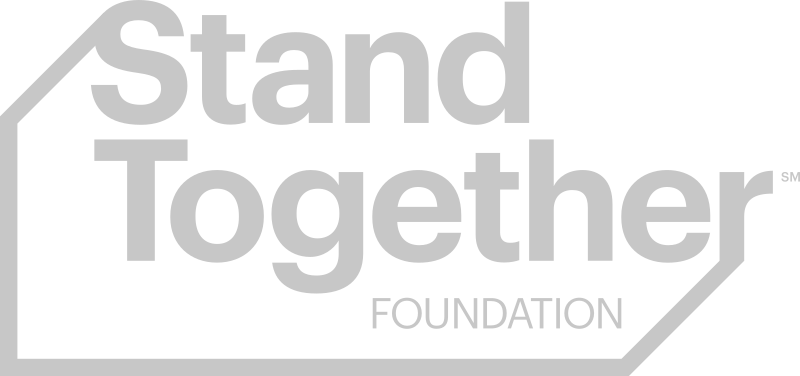One in four women is a victim of domestic violence. It’s the number one cause of injury to women, more than car accidents, muggings, and rape combined.
But aside from these staggering domestic violence statistics, most incidents go unreported, and emotional abuse cases are believed to be the most common type of intimate partner violence.
The effects of abuse extend far beyond the physical, impacting a victim’s long-term mental health, too. So Leap to Success, part of the Stand Together Foundation’s Catalyst Network, offers a unique solution that empowers women recovering from trauma.
With an approach that centers around women supporting women, the nonprofit helps provide a path to confidence and the courage to build a positive and meaningful life.
Trauma and the Brain: The Effects of Domestic Violence
It’s scientifically proven that the effects of abusive relationships physically change the brain. When a person has a traumatic experience, repeatedly experiences trauma, or frequently relives the memory of a traumatic event, the brain strengthens the neural pathways associated with that thought, memory, or experience.
“I was determined to live to tell my story. After that day, I was able to regain my voice in saying, “No more.” Even though it was tragic, it helped me to find my purpose, here with Leap to Success.”
Lakesha Sexton, Leap to Success Graduate
In the case of trauma, these pathways are often associated with stress and anxiety. For victims of domestic violence specifically, the brain is constantly reinforcing the pathways used during traumatic instances of abuse.
As a result, domestic violence can have long-term effects on an individual’s mental health, leading to problems like PTSD, depression, anxiety, low self-esteem, and a lost sense of identity.
Understanding the Types of Abuse
When most people hear the term “domestic violence,” they usually think about physical assault. There are many types of domestic violence, however, that don’t leave physical marks.
In addition to physical abuse, domestic violence can include emotional abuse, sexual abuse, verbal abuse, and even economic abuse. And victims of domestic violence often suffer from more than one type.
What Is Emotional Abuse?
Since emotional abuse doesn’t leave physical bruises, it can be difficult to detect. In fact, many individuals in emotionally abusive relationships don’t even realize that they’re being abused.
Signs of emotional abuse can include isolation, intimidation, and manipulation. At the core, the abuser takes advantage of the victim’s character, insecurities, or vulnerabilities.
You hear all these cliches, ‘Wah, wah, this happened to you, get over it,’ and no one teaches you how.
Darlene Guzzello, Leap to Success Graduate
What is verbal abuse, and how is it different than emotional abuse? Verbal abuse is a type of emotional abuse where a partner threatens, degrades, or embarrasses the victim.
Both emotionally and verbally abusive relationships seem great when they first begin, but eventually turn dangerous without the victim being aware of the change.
Women Supporting Women to Break the Cycle of Abuse
This is where Leap to Success comes in. The tight-knit community of women at Leap to Success focuses on helping those who have survived domestic violence to reach their greatest potential.
When survivors first come to Leap to Success, they often feel afraid, alone, defeated, disengaged, isolated, shut-down, and unlovable – a heartbreaking list of adjectives spoken by heartbroken women. But Leap to Success exists to help these survivors learn to shine from within.
A Two-Part Approach to Healing & Recovery
Founder Dana Bristol-Smith, a former, corporate public speaking coach, helps women see the light inside themselves and gain self-confidence to break the cycle of abuse. She teaches the principles of public speaking in a welcoming environment that centers around women supporting women.
For women who’ve experienced traumatic situations, the conventional approaches are to see a therapist, to ask for help to deal with emotional and psychological issues. And therapy is really important, but what next?
Dana Bristol-Smith, Leap to Success Founder & Executive Director
The Leap to Success program focuses on eliminating the paralyzing effects of fear and anxiety, by providing women with essential skills and a safe, judgement-free environment.
Healing Through Community and Learning
At Leap to Success, domestic violence survivors come together with therapists, trainers, and coaches to strengthen their voices, establish their identities, and carve out a positive place of empowerment in their future.
Healing happens as survivors share their stories, and women regain their power as they learn to “own” their past. Leap to Success provides a community where abuse survivors can learn from others who’ve had similar experiences, as well.
Additionally, Leap to Success provides women with courses on the development of social skills that are essential to moving forward in life. During workshops, women practice active listening and assertive communication.
What we see week by week for most of the women is they do start to feel safe, they start to open up, they start to engage in eye contact, in conversation, and it’s a transformation. We’ve seen it with over 2,000 women who’ve gone through our programs at Leap to Success.
Dana Bristol-Smith, Leap to Success Founder & Executive Director
They learn how to shake a hand and make eye contact with confidence. They gain the personal power to set boundaries that allow them to disengage from negative situations, learning when and how to say “yes” or “no.”
These skills, based on Bristol-Smith’s public speaking principles, allow survivors to gain a sense of self-worth. They’re also necessary for landing new employment opportunities that allow survivors to become self-sufficient and successful.
When women learn these skills, they feel empowered and strong. When they share their stories, they heal. At Leap to Success, women have the opportunity to do both, forming a clear path forward in life.
Over 2,000 Success Stories and Counting
A member of Leap’s first class in 2008, Lakesha was a survivor of a physically, emotionally, and verbally abusive marriage. She nearly lost her life when she decided to stand up for herself in her marriage and fight back.
A testament to the strength of Leap’s domestic violence resources, Lakesha is now a program instructor. She recalls how Leap to Success provided her with the tools she needed to create a new life for herself. She now wishes to use those tools to help other women who are struggling through similar situations, women who are striving for a new life.
After the women graduate our programs, 66% of the women were hired within 60 days, and the number went up to 77% six months later.
Dana Bristol-Smith, Leap to Success Founder & Executive Director
Already having transformed the lives of more than 2,000 women, Leap to Success’s approach has been proven time and again. In the program, abuse survivors heal, recover, and regain their power.
Leap to Success’s vast network of women leave the program with a new set of adjectives to describe themselves: safe, confident, empowered, loved, happy, and free.
This episode of Catalysts, a Freethink original series, was produced with the Stand Together Foundation. For more about the social entrepreneurs who are exploring bold new solutions to big social problems, join us on Facebook on our page, Catalysts.



